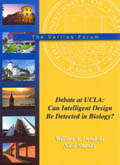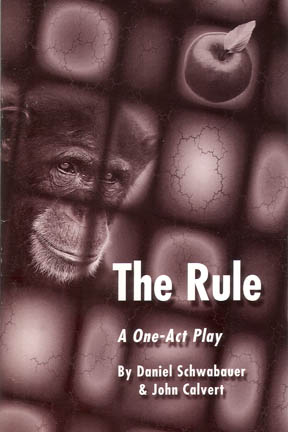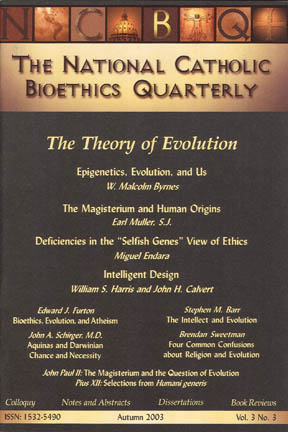
Access
Research
Network
|
|
Access |
ARN-Announce is the on-line announcement and information service of Access Research Network. ARN generates announcements to the current ARN Announce list as information becomes available. You have received this message because your email address was submitted to this list. Subscription and Unsubscription information is at the end of this message.
Click here for a text-only version of this document.
IN THIS ARN-ANNOUNCE:
New ARN Video: Debate at UCLA-William Dembski
vs. Niall Shanks
One of our first ARN videos was a debate on Darwinism held at Stanford about
ten years ago between Professor Phillip Johnson of UC Berkeley and Professor
William Provine of Cornell, and it has been one of our best selling products.
American's love a good fight, especially when it's refereed at one of our
institutions of higher learning. The baton has now been passed on to the
next generation in this 3 round match between heavy weights William Dembski
and Niall Shanks held recently at UCLA. The topic for this debate is "Can
Intelligent Design be Detected in Biology?"
Touchstone Magazine: Darwin's Last Stand?
Returning to a theme first raised five years ago, the July/August 2004 issue
of Touchstone presents the Intelligent Design movement and its critique
of Darwinism and the naturalistic approach to science and society. Touchstone's
first issue on ID, published in July/August 1999, became the book Signs
of Intelligence (Brazos Books), which is considered one of the best
introductions to the ID movement. After five years, the editors wanted to
offer readers an update on the development of the ID movement, which has
reached a maturity and confidence in its engagement with the Darwinist mainstream.
New Book--Agents Under Fire: Materialism and the
Rationality of Science by Angus Menuge
In the Foreword of this new book, noted ID critic Michael Ruse encourages
everyone to read this book-and then refute it. Find out why Angus Menuge's
challenge to reductionism has Ruse so worried.
The Rule: A One-Act Play by Daniel Schwabauer
and John Calvert
Have you ever wondered about the best way to present the Darwin
vs. Design controversy to public high school students and their
parents? How about a One-Act play that reads like a modern day
Scopes trial in reverse? Although a fictional work, you can be
sure that with attorney John Calvert's name on it, it is based
on many of his real-life experiences with local school boards
across the U.S over the past five years.
Article Reprint-Intelligent Design: The Scientific
Alternative to Evolution by William S. Harris and John H. Calvert
The Autumn 2003 issue of The National Catholic Bioethics Quarterly
was devoted to "The Theory of Evolution" and our friends at The
Intelligent Design Network had this excellent article included
in the issue representing the ID perspective.
Wired for Much More than Sound-Neurons and How
They Work - Part II
In his latest "Exercise your Wonder" column, Dr. Howard Glicksman
continues his discussion about how neurons work. Last month he explained
how, once stimulated, a neuron is able to transmit an impulse down its axon
toward another nerve or muscle cell. This month he looks at how the neuron
is able to pass on the message in: Wired for Much More than Sound-Neurons
and how they work-Part II-The Transfer.
A New Face for IDURC: ARN Student Update
ARN originated as a student group and maintains a student division
where inquiring minds feel free to express their thoughts and
write papers for their peers. Check out The Intelligent Design
Undergraduate Research Center's (IDURC) brand new web site which
has been recently overhauled by our student volunteers.
 One of our first ARN videos was
a debate on Darwinism held
at Stanford about ten years ago between Professor Phillip Johnson of UC Berkeley
and Professor William Provine of Cornell and it has been one of our best selling
products. American's love a good fight, especially when refereed at one of our
intuitions of higher learning. The baton has now been passed on to the next generation
in this 3 round match between heavy weights William Dembski and Niall Shanks held
recently at UCLA. The topic for this debate is "Can Intelligent Design be Detected
in Biology?".
One of our first ARN videos was
a debate on Darwinism held
at Stanford about ten years ago between Professor Phillip Johnson of UC Berkeley
and Professor William Provine of Cornell and it has been one of our best selling
products. American's love a good fight, especially when refereed at one of our
intuitions of higher learning. The baton has now been passed on to the next generation
in this 3 round match between heavy weights William Dembski and Niall Shanks held
recently at UCLA. The topic for this debate is "Can Intelligent Design be Detected
in Biology?".
Dembski and Shanks debate whether the complexities of nature require an intelligent designer. Dembski says that there is evidence that such a designer did play a role. Shanks argues that there is no scientific evidence for the claim and the fact that scientists cannot answer certain questions should not, by default, make the case for proponents.
Could intelligent design in biological systems be scientifically detectable, and has it in fact been detected in nature? Intelligent design holds that intelligence is responsible for many of the instances of the order and complexity in the natural world. The idea that intelligence underlies physical reality has a long and illustrious history. Throughout that history, intelligent design has seemed eminently reasonable. Only with the rise of Darwinian evolution, however, has this idea come to seem unreasonable. Is Darwinism now experiencing a crisis that is making its challenge to intelligent design increasingly unreasonable?
Dr. Niall Shanks is a native of England, and earned his Ph.D. at the University of Alberta, Canada. He is currently Professor of Philosophy, Adjunct Professor of Biological Sciences and Adjunct Professor of Physics and Astronomy at East Tennessee State University. His recent book, God, the Devil, and Darwin: A Critique of Intelligent Design Theory (Oxford University Press, 2004), places him at the forefront of an escalating debate spanning the sciences, philosophy, and theology.
Dr. William Dembski is a mathematician and philosopher. He has authored such works as The Design Inference (Cambridge University Press, 1998) and sequel No Free Lunch: Why Specified Complexity Cannot Be Purchased Without Intelligence (Rowman & Littlefield, 2002).
Hosted by the Veritas Forum at UCLA. Includes Q&A. Recorded April 21, 2004. Running time 1 hour 30 minutes.
To order your copy of the Debate at UCLA: Can Intelligent Design Be Detected in Biology video DVD go to http://www.arn.org/arnproducts/php/video_show_item.php?id=28
 Returning
to a theme first raised five years ago, the July/August 2004 issue of Touchstone
presents the Intelligent Design movement and its critique of Darwinism and the
naturalistic approach to science and society.
Returning
to a theme first raised five years ago, the July/August 2004 issue of Touchstone
presents the Intelligent Design movement and its critique of Darwinism and the
naturalistic approach to science and society.
Intelligent Design (or ID) theory argues that science itself reveals that the cosmos and plant and animal life were designed and did not arise and develop accidentally, as evolutionary theory claims.
These ID theorists - most of whom are Christians, but some of whom are not religious at all - also argue that mainstream evolutionary scientists refuse to see the evidence because they have defined science in a way that unscientifically excludes consideration of the divine. The philosophy of "naturalism" is imposed upon the evidence so that the authority of science is invoked for a secular view of the world. Some in the ID movement have gone on to expose and critique the effect of naturalism in other human enterprises, including ethics, art, and politics.
Touchstone's first issue on ID, published in July/August 1999, became the book Signs of Intelligence (Brazos Books), which is considered one of the best introductions to the ID movement. After five years, the editors wanted to offer readers an update on the development of the ID movement, which has reached a maturity and confidence in its engagement with the Darwinist mainstream.
Here's a brief look at the July/August 2004 issue:
To order the June/July 2004 special issue of Touchstone magazine on ID, go to http://www.arn.org/arnproducts/coverimages/b092.htm
By Angus Menuge, Forward by Michael Ruse
 In
the forward to this book philosopher Michael Ruse states "I disagree with just
about everything that he [Menuge] says, and for that reason I urge you to read
his book. Partly because I think he is wrong, and I want him refuted. Partly
because he makes a good case, and he is worth refuting. A far worse sin than
being wrong is being incompetent and boring-and Angus Menuge is neither of these.
He makes the case for intelligent agency and against reductionism, and this
should be the point for starting future debate." I can't think of a better
endorsement for the book than from the keyboard of noted ID critic Michael Ruse.
In
the forward to this book philosopher Michael Ruse states "I disagree with just
about everything that he [Menuge] says, and for that reason I urge you to read
his book. Partly because I think he is wrong, and I want him refuted. Partly
because he makes a good case, and he is worth refuting. A far worse sin than
being wrong is being incompetent and boring-and Angus Menuge is neither of these.
He makes the case for intelligent agency and against reductionism, and this
should be the point for starting future debate." I can't think of a better
endorsement for the book than from the keyboard of noted ID critic Michael Ruse.
From the Dust Jacket
In the first study of its kind, Agents Under Fire defends
a robust notion of agency and intentionality against eliminative and naturalistic
alternatives, showing the interconnections between the philosophy of mind, theology,
and Intelligent Design. Menuge argues that Behe's irreducible complexity is
a challenge to reductionism not only in biology, but also in psychology, and
shows the inability of the Darwinian psychology proposed by Dawkins, Dennett,
and Steven Pinker to explain the integration, unity, direction, and reliability
of rational thought.
This fascinating defense against scientific materialism is the only book-length study relating Intelligent Design to contemporary issues in the philosophy of mind. Drawing on his experience as both a philosopher and a computer scientist, Menuge deftly shows the reader that the materialist's attempts to rid science of all commitment to teleology can only result in incoherence, and presents instead his own unique argument for the legitimacy of Intelligent Design.
About The Author
Angus Menuge is associate professor of philosophy and associate director
of the Cranach Institute at Concordia University Wisconsin. He holds a B.A.
in philosophy from the University of Warwick, and an M.A. and a Ph.D. in Philosophy
from the University of Wisconsin-Madison.
Endorsements
"In this wonderfully insightful book, Angus Menuge details how intelligent
design is systematically dismantling materialism's scientific and philosophical
underpinnings. Though for now materialism persists as academic orthodoxy, Menuge's
withering attack against it in this book signals a coming sea of change."
-William Dembski, author of No Free Lunch and The Design Revolution
"With marvelous clarity and wit, Angus Menuge lays bare the philosophical
incoherence of materialism. He clears the fog to show that the universe contains
not only matter and energy; it contains agents."
-Michael Behe, Professor of Biochemistry, Lehigh University
To order the new Agents Under Fire go to: http://www.arn.org/arnproducts/php/book_show_item.php?id=73
By Daniel Schwabauer and John Calvert
 When
Nate Plummer presents his 10th-grade biology class with an objective look at
human origins, he has no idea it will put him squarely between the Board of
Education and the ACLU, accused of teaching creationism to his students.
When
Nate Plummer presents his 10th-grade biology class with an objective look at
human origins, he has no idea it will put him squarely between the Board of
Education and the ACLU, accused of teaching creationism to his students.
In this one-act play, set during a school board meeting convened to investigate his curriculum, Nate the Biology teacher, finds himself debating his old friend, Dr. Malcolm Trent, Anthropology Professor and School Board Member, to argue the merits and shortcomings of "The Rule", a.k.a the doctrine of Methodological Naturalism.
Arranged in an on-stage format, The Rule touches on a number of concepts and arguments surrounding the "teach the controversy" debate, relating them to the central question: does ID have a place in the science classroom? By framing the argument around fictional characters engaged in real-life situation, The Rule puts the argument in a more practical and comprehensable form.
The format and length of The Rule make it ideal not only as a quick read, but also as a great learning tool for middle- or high-school students, to help them understand what the "teach the controversy" debate is all about.
To order your copy of The Rule: A One-Act Play go to: http://www.arn.org/arnproducts/php/book_show_item.php?id=79

This essay on Intelligent Design was published in The National Catholic Bioethics Quarterly's special issue on the theory of evolution. It appeared along with several other essays on the Theory of Evolution, but is now available by itself in this 31-page text.
"Intelligent Design" provides a concise overview and explanation of the basic origins debate and the relationship of Intelligent Design to the debate. The essay starts from the very root of the subject, by posing the central question, "Where do we come from?", and the obvious follow-up, "Are we here for a purpose?" Harris and Calvert then provide a glossary of terms of the debate, explaining each one in enough detail to educate the reader for what comes next: a discussion of ID itself.
Other sections of the essay include "The Detection of Design", "Evidence Supporting intelligent Design", "Arguments Against Design Theory," and "Evidence Supporting Both Proves Neither."
If you are just getting started on the debate or looking for something that has been published on the topic from a Catholic publication, this quick read will provide a basic foundation of what Intelligent Design is about.
To order The National Catholic Bioethics Quarterly article Reprint on Intelligent Design go to: http://www.arn.org/arnproducts/php/book_show_item.php?id=80

If you have been reading any of Dr Glickman's recent columns you would realize you are very lucky to be alive-if you believe your body is solely the result of chance events and natural processes. Perhaps one day we will collect all of Dr. G's columns in the form of a book entitled "Death by Darwinism: Why Design is the only Intelligent Explanation for Why You are Here" In this month's column Dr. G give us three concrete reasons why random changes to our neurotransmitters would have led to our untimely demise. To read the Dr. Glicksman's latest web column on design in the human body go to:
Wired for Much More than Sound-Neurons and How They Work - Part II: The Transfer

The Intelligent Design Undergraduate Research Center (IDURC) has a brand new web site thanks to Tristan Abbey, Brad Buckingham, Jessica Ferguson and a host of students.
IDURC is the student division of Access Research Network. We are dedicated to a six-part mission statement:
IDURC does not advocate ID - the organization investigates it. Their efforts will include submitting editorials and letters to newspapers and magazines, reviewing relevant books, publishing student work, and conducting interviews with individuals active on all sides of the debate.
The new staff consists of a dozen high school and college students from all across the United States, and even has members in Ireland and Colombia. These energetic students are interested in a diverse range of topics, from philosophy to theology, paleontology to embryology, physics to computer science. IDURC plans to make an impact.
If you are a student who is interested in evolutionary theory and intelligent design, please get involved with IDURC.
To visit the IDURC student website go to: http://www.idurc.org/
All of the ARN products can be ordered through our web catalog store with secure credit card ordering. There you will find a description of each product and you may add as many products as you would like to the electronic shopping cart. The suggested donation for each item includes USPS Media Mail for North American orders, which typically arrive in 5-7 days. Overseas prices include Foreign Surface shipping which may take 4-8 weeks. For faster shipping please include an additional donation and request either USPS Priority or Foreign Air. If you provide your email address, you will receive an email receipt of your order. Place your order today online at www.arn.org (click the products links on the top menu bar). If you have any problems or questions, or would rather place your order by phone, call our toll free number at 1-888-259-7102 and our staff will be happy to assist you (or leave your order with our voice mail system if we are out of the office).
ARN-Announce describes many of the upcoming events and new articles, books, videos and other resources on Intelligent Design. Please forward this message to several of your friends and colleagues to let them know about the resources available at Access Research Network (www.arn.org). Back issues of ARN-Announce can be found at www.arn.org/announce.htm
ARN-Announce is written by Dennis Wagner (dwagner@arn.org)
Access Research Network is a non-profit organization dedicated to providing accessible information on science, technology and society issues from an Intelligent Design perspective.
Mailing Address:
Access Research Network
PO Box 38069
Colorado Springs, Colorado
80937-8069
Contact:
(719) 633-1772 voice
(719) 520-1241 fax
(888) 259-7102 toll-free order line
On the web:
www.arn.org
TO ADD YOURSELF TO ARN-ANNOUNCE:
Send an email to "ARN-Announce-request@arn.org".
The body of the message should consist of the word "SUBSCRIBE"
and nothing else. Or visit the web page at www.arn.org/announce.htm
and select Subscribe and enter your email address. You will receive
a confirmation email indicating your name has been submitted to the
list. Follow the directions and reply to the email and your email address
will be added to the ARN-ANNOUNCE list.
TO REMOVE YOURSELF FROM ARN-ANNOUNCE:
Send an email to "ARN-Announce-request@arn.org".
The body of the message should consist of the word "UNSUBSCRIBE"
and nothing else. Or visit the web page at www.arn.org/announce.htm
and select Unsubscribe and enter your email address. Your email
address will be automatically removed from this list.
Copyright 2004 Access Research Network. All rights reserved. International copyright secured.
7.29.04